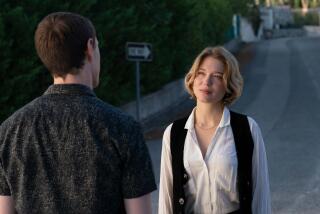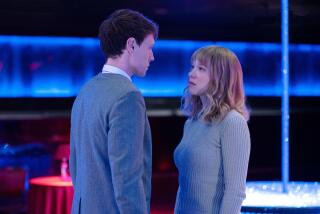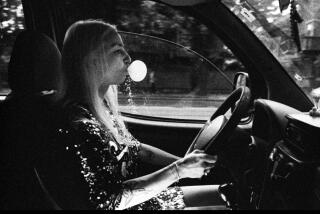Why Claire Denis cast Robert Pattinson in the sensual science-fiction fable ‘High Life’

Robert Pattinson stars in French director Claire Denis’ first English-language film, “High Life,” an erotic space odyssey co-starring Mia Goth and Juliette Binoche. Pattinson, Denis and Goth discuss the film at the Los Angeles Times studio at the To
Claire Denis is a filmmaker’s filmmaker. Though the French writer-director has never had a commercial breakthrough in the U.S., she has been a steady presence in international cinema circles from her debut feature “Chocolat” in 1988 through such titles as 1999’s “Beau Travail,” 2010’s “White Material,” starring Isabelle Huppert, and “Let the Sunshine In,” which starred Juliette Binoche and was released in the U.S. last year.
In part, Denis is so well-regarded because she remains so unpredictable. There is no signature style to her work and it remains surprising with each and every film.
Her latest, “High Life,” which opens in New York and Los Angeles this week via A24, arrives with higher than usual commercial expectations. Long in the works, the film is a lo-fi sci-fi story that finds Denis working for the first time in the English language. She also has as a star Robert Pattinson, who continues his post-“Twilight” run of working with truly singular filmmakers.
Pattinson plays Monte, a man alone on a spaceship with his daughter Willow. Except they weren’t always alone — Monte was a death-row inmate sent into space with other convicts. The narrative jumps around in time to reveal how the unusual intervention of an on-board scientist (Juliette Binoche) leads to Willow’s birth and sets in motion their future course.
In a recent interview, Pattinson recalled that he was in Louisiana shooting one of the “Twilight” movies when he first discovered Denis, coming across “White Material” on TV late one sleepless night. He immediately emailed his agents about her. Though it took some time, they eventually met in Los Angeles.
“I was expecting a kind of philosophy lecturer or something, I was absolutely terrified for the meeting,” recalled Pattinson. “And then almost immediately, she’s got the most perverse sense of humor and she’s like a little weirdo. She’s really witty and odd. The way I always describe her, she seems like a genuine kind of punk to me. A very sensitive punk.”
Working with Denis, Pattinson appreciated the way in which so many of her films exist as a world unto themselves. “High Life” is brimming with peculiar rules and ideas, motivated by an internal logic that makes its own idiosyncratic sense.
“Reading the script, I was trying to understand how Claire approaches things, even the way the dialogue was written, so that I could understand it in some kind of cerebral way,” said Pattinson. “And then after a while I realized the bits that I liked the most are the bits which you don’t understand at all.”
In conversation, Denis is much like one of her movies — spinning vivid tales with their own internal narrative flow. Ahead of the film’s world premiere at last year’s Toronto International Film Festival and straight off a flight from Paris, Denis sat down to discuss “High Life” over a glass of red wine and a cup of hot water. And also just like her movies, there was an air of international adventure, at once sensuous and somewhat austere.
There has been a lot of expectation around “High Life.” Did it feel for you that this movie was more difficult to make?
No, it’s a very strange thing because it came so easily. I mean I met this English producer Oliver Dungey, and like seven or eight years ago he showed up at my agent’s and he said he wanted to meet with me and he said, “Claire, I have a project I would like so much to make with you. Would you consider possibly to work on a project that I could call ‘Femme Fatale?’” And I liked the fact that he wanted to work with me. It was flattering, you know. But also he was very gentle, and he expressed so well what he wanted.
And I said, “Look, the only way for me to have a femme fatale is in the real sense of the word, which means it’s the last one. It’s the end. And I think probably it could be a man alone in space, in a spaceship where everybody died and he’s alone with a baby girl and he knows there is no return because they are so far away from the solar system. It’s a poor ship. It’s not a very elaborate ship. And this is a femme fatale because it is the tragedy of those two people, the baby and the man, that they are going to be the only alive human being for all their life. And the only thing he’s afraid of maybe is to die too early because she might be alone as a baby in a ship. And then suddenly she is a teenager and she’s almost a woman. And there comes another danger of attraction.”
This was the very beginning, like I told him that, and he said, “Of course I am surprised, it was not at all what I thought, but if you’re interested then let’s do it.”
Tell me about casting Robert Pattinson.
Of course everyone thought it should be a science fiction actor, like an action movie actor. And I thought exactly the opposite. And then I met Robert and I must say Robert really wanted to meet me, which was very nice, but I was also a little bit surprised because for me he was a young, iconic actor and I thought it’s exactly the opposite of what I had in mind — sort of 40 years-ish actor, exhausted. And maybe I hesitated a little bit, it took me a few months and then I realized his wanting to be in the film was interesting.
I was not flattered, on the other end I was a little bit afraid because as I said, he is an iconic actor and I wanted a sort of mysterious film, not an iconic film. But then I realized Robert was so ready to go anywhere with me. And then I realized he is a very mysterious young man.
And have you been wanting to make a film in English?
I told the producer, for me in space in my generation there is only two languages, Russian and American. So I thought it was better for me to do it in English because my Russian is not better than my English. And that’s it, you know? I said you should have a good reason to do an English-speaking movie. Space is a good reason, I guess.
Did this film feel more ambitious to you in the size of the production and that you had to work on sets?
No. It’s the first time I had a set, but it was so nice; it’s just for me. This story belonged so much to me that, for me, it’s not an expensive movie or a stylish movie. It’s mine. Nothing else.
Do you feel that way about all your movies, that they belong only to you?
Maybe this one a little bit more because it’s like a box. I own the box and inside I have nine characters, you know, and it’s more like mine. Maybe, I’m not sure. When I shoot on location, I’m always aware that I am part of the world. My characters are part of the world. They are part of the story, but they are surrounded by the real word. It was the first time I was surrounded by void. There was nothing else but us.
This film has some additional writing credits, and I’ve read that there was a draft of the film by Zadie Smith and Nick Laird you did not use. Is that something you can talk about?
I can. No problem. The drafts were by Jean-Pol Fargeau and me. It was written in French, and Geoff [Cox] made it in English. It’s not a new translation. I needed to speak with someone so I was sure it was like in French — had the same feeling of the words. And then during shooting, because of the schedule, I wanted to make sure I had Andrew [Litvak] with me on the set to be able to correct the accent on the words.
But the thing with Zadie Smith is different. My producer Oliver Dungey, he liked Zadie Smith a lot and he introduced me to her. We met in a pub in London. I had read her two novels in English and in French. And I thought, she’s not really the type of writer I would care for, but she’s great and it would be great to work with her and then it turned immediately down. She hated the story. She disliked the casting and she wanted to change the story and she wanted to work with her husband. So I asked her, “Tell me the story you want.” It was so different. It was so unsexy for me. So it’s not a fault, you ask someone to enter in my world, she did not. So there was not even a draft. There was nothing but a nightmare. A nightmare because it was a loss of time and painful.
Do you consider the movie sexy?
I think filmmaking is sexy. So every film is sexy for me. If a film is not sexy, it’s a little bit embarrassing, you know? Even if it’s very stern, even if it’s “Mouchette” by Bresson, it is sexy. A film that has no relation to sex, I don’t know what it is.
Given that “High Life” is a science fiction film and stars Robert Pattinson, would you hope that this movie gets you a new audience, a bigger audience? For people who haven’t seen your other films, this might be a way for them to discover your work.
I don’t believe in this kind of thing. I think if I was a kind of director using Robert to get a bigger audience, I would puke on myself. It’s disgusting. I worked with Robert because Robert is great. That’s all. And just this sort of using him to get a greater audience is obscene to me. Really obscene.
A number of recent filmmakers like Barry Jenkins and Greta Gerwig have talked about you as someone who really matters to them. What does that mean to you to hear a younger generation of filmmakers point to you as an influence?
I don’t consider it’s a generation thing. I think when I met Barry Jenkins, I never saw it like I was the teacher to someone. I think my films are made with a lot of irrational emotion, always touching the sensations and maybe I rely on that and maybe that’s what some other directors — younger, yes — are interested in. I don’t think I invented a style. I think I care for sensation, and many directors don’t care anymore for that. And so maybe directors turn to me when they are like me.
Review: Robert Pattinson takes a dark, thrilling space odyssey in ‘High Life’ »
More to Read
Only good movies
Get the Indie Focus newsletter, Mark Olsen's weekly guide to the world of cinema.
You may occasionally receive promotional content from the Los Angeles Times.







